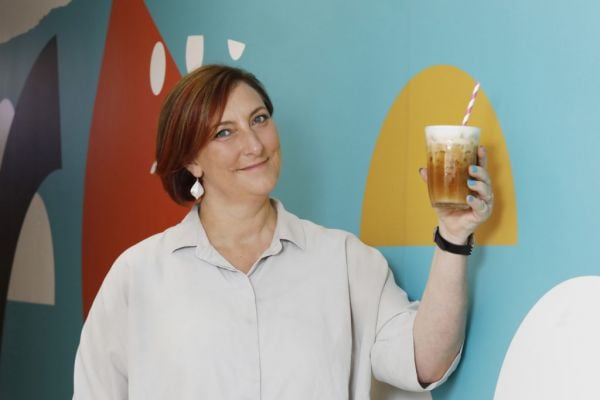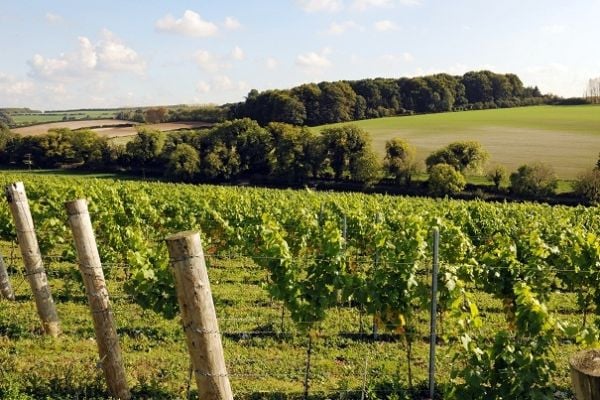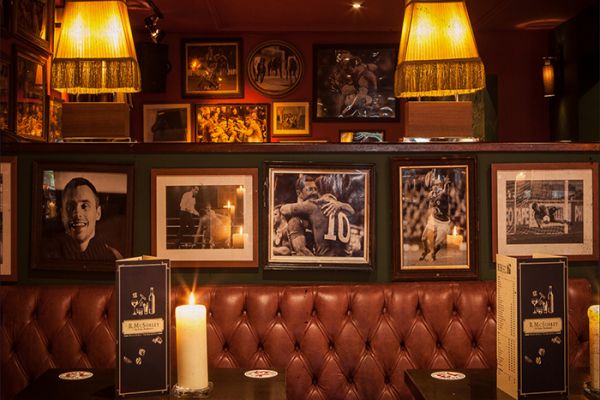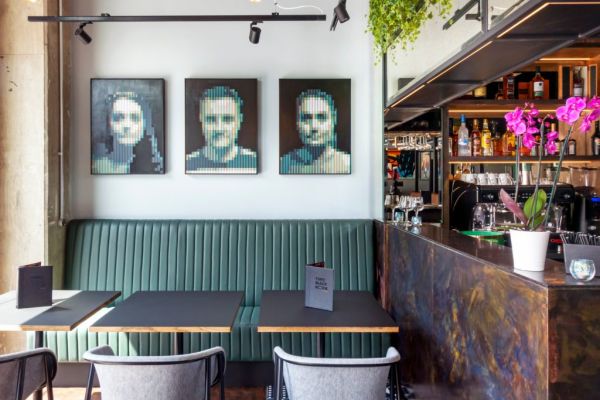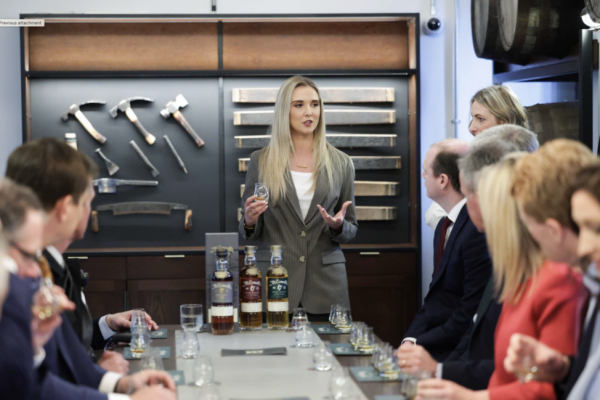John Farrell is a restaurateur who has proved both his vision and his ability to execute it, with some of Dublin’s most popular restaurants: Dillinger’s, The Butcher Grill, 777 and Super Miss Sue. Emily Hourican spoke to him about innovating and the peculiar advantages of the recession.
"The last thing I approach is is actually making money. You hope that will follow at some point, if you do your job to the best of your ability, but it’s not the primary motivation. I would have been a banker if I had just wanted to make money.”
So says John Farrell, the man behind a clutch of Dublin’s most popular restaurants, Dillinger’s, The Butcher Grill, 777 and Super Miss Sue, which operates three distinct parts: a cafe, a restaurant and a takeaway. Luna, his fifth restaurant (a high- concept Italian located downstairs from Super Miss Sue), is now open on Thursdays, Fridays and Saturdays.
Italian seems an interesting choice, I say. Why did his mind turn that way? “I wanted something specific, with a strong identity. A recent visit to New York gave me a new interest in Italian. Italian food is great, and there aren’t many in Dublin at the moment – and it doesn’t have to be your typical layout and design. Luna is going to be great fun, with great music, lots of theatre, a charcuterie section wheeled to the table, trays of aperitifs, digestifs. It’ll have more energy, be more social. It’s what people want now.”
When John talks about the “burst of energy” in the Dublin dining scene in recent years, saying that it is “great for everyone in Ireland, and for the tourists”, he knows exactly what he’s talking about because each of his four restaurants has been a cornerstone of that energy burst.
“It was probably brought about quicker because of the recession,” he admits. “People have been able to afford to open places, whereas before, they wouldn’t have had the opportunity. It has been possible to take more risks. That’s why you see such a change. A chef and a manager coming together, with, say, €100k between them, that wouldn’t have got you anything during the boom years. Now it will. Building relationships with builders and carpenters, for example, who were struggling, too – that started to happen, too, allowing people to pay a bit up front and rest maybe a few months after opening. There was more leeway.”
And, yes, John puts himself into that category. Dillinger’s was the first restaurant he opened, on the site of what had been Dylan McGrath’s Michelin-starred Mint. "Without the recession, I wouldn't have been able to afford to purchase Mint. It just wouldn't have happened. I used my SSAI savings scheme and MBNA credit card to purchase it when it was in liquidation. I would never have been able to do that during the boom years.
"I got a lot of free PR and a lot of attention when we opened Dillinger’s because it was kind of the story of the recession – ‘casual-dining place replaces Michelin-star restaurant’. I wouldn’t have had a recession if it was my choice, but it happened, and I still had confidence in myself, even though times were bad.”
Although John picked Ranelagh carefully as a location – “I thought it was a good area – restaurants there tended to do quite well” – even so, he was astonished at how fast Dillinger’s took off. “I really didn’t expect it to do that well! I remember the opening night. I was as nervous as hell. My hands were sweating.”
After that came The Butcher Grill, then 777 and Super Miss Sue. In each case, John owns 50% of the restaurant, with the other 50% held by a silent partner, often a different one for each place. “We don’t really see each other that much,” he says cheerfully. “ I set up the business, I come up with the ideas, staff them, and get on with it.” Does he see the pace of change slowing down a bit? “It’s certainly harder to find locations now – which is a sign that we’re out of recession. I don’t think it’s crazy yet, but there is a change. There was a big increase in tourists in the last year, which is great, but there is also more competition.”
John’s background is an interesting mix – Ballymun, Botswana, Zimbabwe and South Africa. It’s the kind of eclecticism that can be seen in his restaurants, and works to good effect.
“In the early 1970s, there were a lot of Irish tradesmen who went to Africa,” he tells me. “My dad was one of them. He saw an ad, and he went out to work. He moved around a lot, and in Botswana, he met my mother, who is English but had lived in Cape Town for a long time, and they came back to Ireland and got married.”
Background
When John was three and his sister 11 months older, the family moved back to Botswana. “It was just to be a very short stint – 12 months,” John says, “but my dad died there, in a car accident – a burst tyre.” So John, his mother and his sister moved back to Dublin, to Ballymun.
“My dad had life insurance, but no one informed my mum about anything, and the life insurance lapsed after seven years and she couldn’t claim it,” John says. However, his memories of Ballymun in the late 1970s and early eighties are happy ones.
“I had a great time,” he says now, with a laugh. “We lived in one of the seven-storey towers, and there were lots of friends, lots of playing outside. I have fond memories of it. There was a very strong sense of community. We were friends with the people upstairs, downstairs, sideways. It was just where I was from, where I lived.”
John’s mother, however, was unusual for the time and place in which she found herself. He remembers the raw carrot sticks and wholemeal bread she would send him to school with, food that made him stick out a mile among the packets of crisps and white-bread sandwiches of his peers.
Ballymun changed as John grew older, and the heroin epidemic of the 1980s took hold. “If you walked up the stairs of the flats, on every landing you’d see needles and stuff. I remember that clearly. It was all out in the open.”
There were suicides, too. “There were people who jumped off our block,” John recalls. “Twice I have vivid memories of my mum going downstairs and trying to help someone who had jumped off one of the flats.”
The final straw, as he remembers it, was the death of a kid who lived downstairs. “He must have been 15 or 16,” John says. “He had an Alsatian dog – that’s how I remember him so clearly – and he was a nice kid, always really friendly, and then, I remember, one afternoon we went downstairs and his mother was crying and he was being taken out in a black zip-up bag. He’d taken an overdose. I didn’t notice as a kid if he was hooked on heroin. He didn’t really look anything out of the ordinary, or as if he was on drugs, not to me, anyway, but I think then my mum realised, hang on.”
By then, John was 11, and his mother realised that it would be harder and harder to protect her children from what was happening around them, so she decided to go back to Africa. “My gran was living in Zimbabwe at the time and had a clothing store, and my mum’s sister lived in Johannesburg, so she had a few options.”
Out Of Africa
The transition from a grey, depressed Dublin to the colours, the heat, the smells of Africa was, he says “amazing. Just amazing. I wanted to see a lion, an elephant – I was surprised they weren’t running round in the streets!”
From Zimbabwe, the family then moved to South Africa, where John finished school. “I wanted to be a furniture designer or a carpenter, but you can’t study there unless you have money, and we didn’t.” Instead, he went into an employment agency with a friend.
“There was one lady with a Rolodex, and she said, ‘There are two jobs going: one is selling insurance door to door, the other is working in a kitchen.’ We both said, ‘OK, we’ll take the insurance.’ Then I came back three weeks later, having realised I couldn’t sell insurance, and said, ‘Can I take the kitchen job?’”
That was the beginning of something big. “I loved it. It was like a second family – the energy, the sense of community. You’re in a social environment. People hang out together, go for drinks together. I was by myself then – I’d moved out of the house – and this was like a second family. It was the feeling of community rather than a love of food that got to me. The restaurant was home from home.”
John started as a kitchen porter. “The owner liked me,” he recalls. “He thought I learned quickly, so moved me from kitchen porter to commis chef, then put me on to a grill they had with 180 seats, where I learned how to grill for a full house on a weekend. Then they had a place in a town called Ladysmith, and he sent me up there to manage it. I didn’t know how to do anything! He threw me right in at the deep end and I found it very hard going, but failure teaches you more than success. You really learn from that. Luckily, it doesn’t have to be a massive failure to teach you!” Eventually, John moved to Cape Town and then back to Dublin in 1999. I remember trying to get a job, and it was quite difficult. If you didn’t have experience in Ireland, you didn’t have experience, basically. So I got a job in Keogh’s coffee shop on Trinity Street. I worked there for six months, then to Il Primo under Dieter. Then he sold it, and I got a stake in that. I sold that stake in 2009, and that’s how Dillinger’s happened.”
John learned a lot from working in Il Primo – sometimes of the what-not-to-do variety.
“I have never wanted people to come to a restaurant to see me. I always wanted each restaurant to stand on its own feet, without me. I learned that from working with Dieter. People came to Il Primo to see him, and so he was there every Friday and Saturday night. If you do that, you have no life – and you may also have tunnel vision. Being there constantly makes it hard to see what’s wrong or not working.
"So each of my places is set up with a manager, an assistant manager, head chef, sous-chef, and so on. Then there is a community manager, who looks after them all. I love popping in, chatting, but most of my week is like an office job. I work Monday to Friday, nine to five, and I don’t get involved with the day-to-day running of the restaurants.”
Clearly, John could do that and also be the person with the vision, driving the business forward. So what are his current plans? So far, he has stayed away from brand extensions – a 777.2, for example, or a Dillinger’s South Quarter. “It’s exciting to do something new, for me and for the people who work with me, so no brand extensions for the moment. We’ve revamped the menu in Dillinger’s to make it more eclectic. There is a cookbook for 777 in the works, and Luna, of course. At the moment, while we wait for ESB to catch up with us, that space is a pop-down, where we can do anything we want, try new things.”
Lucky Number 777
The old saying about pioneers getting shot and settlers getting rich doesn’t seem to apply to John. By that token, 777 should never have succeeded – too different, too unorthodox, with too much education required of customers – and yet, it succeeded brilliantly, though not immediately.
The first thing John did was to bring over Rene Ortiz from the States. Ortiz had worked with Daniel Boulud, Alain Ducasse and Jean-Louis Palladin before bringing everything he had learned into a new kind of contemporary Mexican cuisine.
“No one knew what any of the dishes were at first,” John says, “because it was totally different to anything else that was here. In the beginning, we had to explain the philosophy behind the dishes, where they came from, but it was nice to see people learning about the food and appreciating it.”
Quite apart from the food (a far cry from chimichangas and fajitas), there is the matter of counter dining, something that Irish diners traditionally do not take to – preferring table seating or, better still, a booth – but which makes excellent commercial sense in a small space, where there simply isn’t room to fit enough tables to make financial sense.
“That was the policy from the beginning, to seat people at the counter,” John explains, “and in the first three months, people really didn’t get it, even though we made the bar stools really comfortable. A lot of people didn’t want to do that, so the first three or four months were difficult. It took a while for them to start to get it. Now they do.”
The 777 restaurant was probably the first authentic Mexican in Dublin, responsible in no small part for what has been a wave of Mexican restaurants opening around the city since. So has that level of competition made life harder? “No, in fact, the opposite. Before we were importing a lot from the States. Our margins were all over the place. Now it’s easier to get things here because there is an Irish supplier.”
To what does John attribute success? “It boils down to doing your research correctly – from the design of the place, right through to the menu.” Simple – and not so simple.
What are the challenges right now? Staffing is an issue, he says. “There were a lot of Mauritians working in the restaurant industry here, and they really helped it, but it is much harder now for them to get visas. I don’t see so many CVs coming in from Mauritians any more, which is a pity. And it’s hard to get chefs, anyway. If I put up an ad for a head chef, out of 200 CVs, two might be possibilities.”
Costs, too, are a challenge – of course. “At the end of the week or the month, looking at the P&Ls, there are so many overheads: rates, charges, training costs, taxes, licences to dispose of grease from DCC – there are lots of those things, so many costs. You can have a busy restaurant, a great month, and you’re still looking at the balance sheet at the end of the month and thinking, ‘Oh, dear!’ And that’s not even counting corporation tax at the end of the year.”
On the plus side, John’s customers are growing in knowledge and interest, along with the restaurants. “They’re really into it now,” he says. “They know, they’ve travelled – more than we’ve travelled – and that makes it easier because they know what we’re doing, and they’re willing to try new things.”
Does he ever think what life would have been like if he’d stayed in Ireland? “I don’t know, but it wouldn’t be like this. Taking that job just after leaving school was a piece of chance. It wouldn’t have crossed my mind to enter a restaurant before that.” Ah, the happy hand of fate!






